In Japanese, kore, sore, are, dore これ, それ, あれ, どれ mean "this thing (near me)," "that thing (near you)," "that thing (away from us)," and "what thing?" They're kosoado words that refer to things in general.
Sometimes, are? あれ? is an interjection of doubt: "huh?"
Demonstrative Pronouns
Like any other kosoado pronouns, kore, sore, are, dore differ according to their prefix:
- kore
これ
This thing. (near me.) - sore
それ
That thing. (near you.) - are
あれ
That thing. (far from us.) - dore
どれ
What thing?
Usage Examples
- Context: teaching someone how to use a computer.
- kore wa?
これは?
This thing [is]? - mausu. {sore wo tsukatte}
sousa suru no yo
マウス それを使って操作するのよ
Mouse. {Using that thing} [you] operate [the computer].
- kore wa omoshiroi
これは面白い
About this thing: entertaining.
This is funny. - kore wa nani?
これはなに?
About this thing: what?
What is this?- kore wa nandesuka?
これは何ですか? - kore wa nandeshouka?
これは何でしょうか?
- kore wa nandesuka?
- kore wa dame da
これはダメだ
About this thing: [it] is no good.
This is hopeless. This won't work. This isn't allowed.- dame ダメ has various meanings.
- Kore wa Zombie Desu Ka?
これはゾンビですか?
About this thing: is [it] a zombie?
Is This a Zombie?- zombi
ゾンビ
Zombie.
- zombi
- {sore wa iwanai} hou ga ii
それは言わない方がいい
About that thing: [it's better if] {[you] don't say [it]}.
It's better if you don't say that. - sore wa ikenai!
それはいけない!
About that thing: [it] can't go! (idiom.)
That is bad!
You can't do that!
We can't let that happen! - sore wo kiite anshin shimashita
それを聞いて安心しました
Hearing that thing, [I] felt relieved.
I felt relieved after hearing that. - are wa sugokatta!
あれは凄かった!
About that thing: [it] was amazing!
That was amazing! - dore ga hoshii?
どれが欲しい?
What thing is wanted?
Which one do you want?
The way kore, sore, are, dore work is fairly simple and consistent. The real problem is the rest of the phrase. There are many grammar points that frequently make use of these pronouns, so to understand a phrase with kore, sore, are, dore, you'll need to understand other stuff first.
The best way to illustrate this is with the i-adjective ii いい, "good," which has some extremely confusing uses. For example:
- sore ga ii
それがいい
That thing is good.
That is good.
This makes perfect sense. But then:
- sore de ii
それでいい
By that thing [it] is good.
It's fine that way. (we don't need to do anything about it.)
Wait... where did this "fine" and "way" come from?
It came from -de ii ~でいい, of course. Without knowing that, you wouldn't be able to understand the phrase. Even though kore, sore, are, dore are the easiest pronouns, they're always surrounded by the hardest grammar, so watch out.
Fortunately, once you know how the rest of the phrase works, switching sore, "that," by kore, "this," is consistent:
- kore de ii
これでいい
It's fine this way.
それ vs. あれ
The difference between sore and are is that sore それ is close to the listener, while are あれ is far from both the listener and the speaker. For example:
- kore wa nani?
これはなに?
This is what?
What is this thing close to me? - sore wa nani?
それはなに?
That near you is what?
What is that thing close to you? - are wa nani?
それはなに?
That far from us is what?
What is that thing far from both of us?
- Context: western man gets served Japanese food with chopsticks.
- nanda, kore wa?
なんだ、これは?
Is what, this thing?
- kore wa nanda?
これはなんだ?
What is this thing? (right in front of me.)
- kore wa nanda?
vs. この, その, あの, どの
The difference between kore, sore, are, dore これ, それ, あれ, どれ and kono, sono, ano, dono この, その, あの, どの is that kore, sore, are, dore are nouns, while kono, sono, ano, dono are adjectives.
In English, "this," "that," and "what" can be used as either nouns or adjectives. When they're used as nouns, that is, when "this" means "this thing," you use kore, but when "this" comes comes before another word to qualify it, you use kono. Observe:
- kore wo kau
これを買う
To buy this thing.
To buy this. - kono geemu wo kau
このゲームを買う
To buy this game. - *kore geemu wo kau
これゲームを買う
Intended: "to buy this game."
Closer to: *"To buy this thing game." - *kono wo kau
このを買う
Intended: "to buy this."
- In general, wo を can't come after adjectives.
- The only exception is metalanguage: if it was a weird situation where we're buying the word "kono" literally, then it doesn't work as an adjective, but as a quoted phrase.
- "kono" wo kau
「この」を買う
To buy "kono."
The words kore and kono can refer to the same thing. For example:
Toward People
Normally, kore, sore, are, dore aren't used to refer to people, only to things. This is just like you don't call people "it" or "that" in English. It would be disrespectful and perhaps offensive.
Sometimes, it happens in anime for comedic reasons: a character is so weird you don't treat it as a person anymore, you treat it as a thing.
- Context: Satou Kazuma 佐藤和真 introduces his
haremparty. - haai, koitsu φ Akua
はーい、こいつアクア
Ookay, this [is] Aqua. - ore φ Kazuma
俺カズマ
Me, Kazuma. - kocchi φ Megumin
こっちめぐみん
Here, Megumin. - kore φ Dakunesu ne
これダクネスね
This thing [is] Darkness, okay. - Darkness ダクネス, who is a "masochist," do-M ドM, becomes overjoyed by the inhuman treatment.
- watashi wo "kore" yobawari
私を「これ」呼ばわり
[He] called me "this thing." - kore
これ
"This thing." - marude {{mono no} you na} atsukai
まるで物のような扱い
It's as if [I was] treated {like {a thing}}.- Literally: like treatment similar of thing.
Toward Ideas
The words kore, sore, are can refer to ideas, abstract concepts, in dialogue besides tangible, physical things.
This is just how I used the word "this" right at the start of this line. That "this" was referring to the previously mentioned concept. In Japanese it works the same way, except you have three words:
- kore
これ
This.- Something I am talking about.
- sore
それ
That.- Something you mentioned.
- Something I mentioned, but that happened in the past.
- are
あれ
That.- Something that happened in the past.
For example:
- kore wa watashi no yume desu
これは私の夢です
This is my dream. (the thing I just talked about is my dream.) - sore wo iu na!
それを言うな!
Don`t say that! (the thing you just said.) - sore wa shippai datta
それは失敗だった
That was a failure. (the thing I talked about.) - are wa abunakatta
あれは危なかった
That was dangerous. (that thing that happened.)
- Context: Edward Elric エドワード・エルリック drags his younger brother into a life of crime.
- yooshi
よーし
Aaalright. - ima kara {choito hou ni fureru} koto suru kedo
今からちょいと法に触れる事するけど
[Starting] now, [I] will do something [that] {violates the law a bit}.- choito
ちょいと - chotto
ちょっと
A bit. A little. - hou ni fureru
法に触れる
To touch the law. To collide with the law. To violate the law. - fureru
触れる
To touch. (as a matter of fact: ended up touching, brushing against.)- sawaru
触る
To touch. (intentionally: he touched the cat, petting it.)
- sawaru
- choito
- omae φ {mite-minu} furi shiro
おまえφ見て見ぬふりしろ
As for you, pretend {not to see [anything]}.- mite
見て
To see, and... - minu furi
見ぬふり
Pretend not to see.
- mite
- yoisho~~
よいしょ~~
[Heave-ho!]- Expression of effort, he used it when climbing.
- he!?
へ!?
[What]!? - ...sore tte hanzaisha ni nare tte koto?
・・・それって犯罪者になれってこと?
...is that: "become a criminal," is what you're saying?- You're telling me to cooperate in a crime!
- dame ka?
ダメか?
Is [that] no good?- Is that not okay?
- Will you not help me?
- pan
パン
*clap*
それでは Farewell
The phrase sore dewa それでは, and its contraction sore ja それじゃ, can be used to bid farewell.
- sore dewa
それでは
And with that, [I take my leave].
あれ Reminder
The word are sometimes refers to an idea that's implied to be known by both speaker and listener, but that the speaker is having trouble describing: it's that thing, you know, that thing.
- Context: Minami Kana 南夏奈 welcomes home her younger sister, Minami Chiaki 南千秋.
- tadaima
ただいま
[I'm back]. - okaeri
おかえり
[Welcome back]. - tteiuka, are da na
っていうかアレだな
[Or rather], [it] is that.- are da - "[it] is that," as in "you know, it's that thing when, which, etc.," used like this to refer to an idea the speaker assumes to be known already, and will remind the listener of next.
- omae wa hayaku kaette watashi no asobi-aite wo suru beki da
おまえは早く帰って私の遊び相手をするべきだ
You should return home quickly and be my play-partner.
You should come home quickly to play with me.- Kana reminds Chiaki of what she should do.
- konna jikan made doko hottsuki-aruiteta-n-da, kono yarou
こんな時間までどこほっつき歩いてたんだこの野郎
Where were [you] loitering around until this [late], you bastard?- konna jikan made - until this hour, until this late.
- ~teta-n-da - contraction of ~te-ita no da ~ていたのだ.
あれ Bad
Sometimes, saying something is are あれ, is "that," means it's bad or awkward somehow. It's, well, you know, "that."
- {iu} no mo are da shi
言うのもあれだし
Besides, {saying [it]} would be "that."- Phrase used when someone explains why they're refraining from saying something, e.g. why don't you ask that person for the thing yourself? Because saying it myself would feel awkward, or embarrassing, or it wouldn't be a nice thing to do, etc.
- Context: vikings viking around.
- {hajime wa are datta} kedo Ingurando (kocchi) no biiru nimo chikagoro narete-kita yo na
はじめはアレだったけどイングランドのビールにもにも近頃なれてきたよな
{At first [it] was "that"} but lately [I feel like] [I] have gotten used to England's beer.- i.e. at first the beer felt weird, but lately he's gotten used to it.
- kocchi こっち, "this side," is used as gikun 義訓 for England in this panel because the vikings aren't from around England, i.e. their country is "over there," acchi あっち, and to "this direction," "this side," "around here," kocchi こっち, is England.
- a! ii na, ore nimo hitokuchi
あ!いいな オレにもひとくち
Ah! [That] is nice. Give a sip to me, too.
これから, それから, あれから
The phrases kore kara, sore kara, are kara are one way the pronouns can be used toward ideas. That's because they mean "from this event, that event on." In English, this would more naturally be translated as:
- kore kara dou suru?
これからどうする?
What [you] will do from this on?
What [you] will do from here on? - sore kara dou shita no?
それからどうしたの?
What happened from that on?
What happened from there on?
As you can see, kore, sore, and are, can be translated as "here" or "there" in the sense of time.
これまで, それまで, あれまで
Similarly, kore made, sore made, are made mean "until this event, that event," and would more naturally be translated as:
- kore made no koto
これまでのこと
The things until this.
Everything that happened up to now.
Everything that happened until now. - sore made
それまで
Until that.
Until that point.
Until then.
Using どれ
The way dore works in Japanese is rather tricky because many resources translate it as simply "what," it's naturally translated as "which one," and the way I translated it in this article was as "what thing." So it's a mess. However, once you grasp the trick it's really easy.
どれ vs. なに
Let's start with the difference between dore どれ and nani なに, both meaning "what" in one way or another.
When you have a question with nani なに, you can answer anything:
- {suki na} iro wa nani?
好きな色はなに?
What is the color [that] {[you] like]}?
What color do [you] {like}? - {watashi no {suki na}} iro wa ao
私の好きな色は青
The color [that] {I {like}} [is] blue. - watashi wa {ao ga suki da}
私は青が好きだ
{Liked is true about blue} is true about me.
I like blue.
When you have a question with dore どれ, you can only answer kore, sore, are, or rather, dore always asks about a thing that you can refer to by kore, sore, are. They must be things that you can point to. If we're talking about colors, it must be only the colors that you can see somewhere.
- {suki na} iro wa dore?
好きな色などれ?
What color do [you] like?
Which color do [you] like?
- From these colors that you can point to.
- {watashi no {suki na}} iro wa kore
私の好きな色はこれ
The color [that] {I {like}} is this one. - watashi wa {kore ga suki da}
私はこれが好きだ
I like this one.
It's worth noting that when nani 何 is followed by the da だ copula or the desu です copula, it's contracted to nanda 何だ and nandesu 何です. The ~i disappears.
There's another pair of contractions that have nothing to do with these: the nanda なんだ and nandesu なんです that come from na no da なのだ and na no desu なのです.
- kore wa nanda?
これはなんだ?
What is this thing?- nanda - nani plus da.
- kore nanda!
これなんだ!
[It] is this thing!- kore na no da.
これなのだ
- kore na no da.
In general, people don't ask questions with dore as often as they ask questions with nani, nanda, nandesuka, simply because you're unlikely to ask a question about only things that you can see.
- kuruma wa dore desuka?
車はどれですか?
The car is which one?
Which one is the car?- Among all these cars parked around here. Is it this one? Is it that one?
The word dore どれ can also be used to say "let's see" when you're checking something someone else is showing you. Like they've cooked a dish and you're checking the flavor to see if it tastes good, and so on.
どれ vs. どっち
Both dore and docchi can mean "which." The difference between dore どれ and docchi どっち is that docchi is used when you have a choice between only two things.
This only happens between saying kocchi, socchi, "this direction," "that direction," is more natural when you have a bifurcated path.
- docchi ga hoshii?
どっちが欲しい?
Which one (of these two things) do you want? - dore ga hoshii?
どれが欲しい?
Which one (of these three or more things) do you want?
どれでもいい
The phrase dore demo ii どれでもいい means literally "whichever is good," or, in other words, "it doesn't matter which."
This word, too, is used when you have two or more choices. If you have only two, then you'd use docchi demo ii どっちでもいい, "it doesn't matter which (of the two)." Either one is fine.
どれくらい
The phrase dore kurai どれくらい means "how much" in Japanese. An example of how it's used:
- dore kurai?
どれくらい?
How much? - dore kurai ga kakaru?
これくらいがかかる?
How much will it take?
How much will it cost? - dore kurai jikan ga kakaru to omoimasu ka?
どれくらい時間がかかると思いますか?
How much time do [you] think it will take?
How long do [you] think it will take?
This usage is kind of odd given what we already know about how dore works, for two reasons:
- "How much" sounds like an open-ended question: "three hours" isn't the same thing as "this" or "that."
- kurai 位 is a noun, so it makes more sense to say dono kurai どのくらい instead, as dono is an adjective.
Regarding the first problem, dore kurai is valid because you can say this in Japanese:
- kore kurai
これくらい
This much. - sore kurai
それくらい
That much.
Grammatically, kono kurai このくらい, sono kurai そのくらい would make more sense, reinforcing the second problem.
Regarding this second problem, the answer is that dono kurai, etc. are also used. In fact, they were in use before dore kurai. The phrase dore kurai only started being used around the Meiji period. They both mean the same thing. Even though dore kurai makes less sense, it's not considered wrong or anything. You can use either if you want.[「どのくらい」と「どれくらい」は同じですか?違いは何ですか?使い方を教えてください。 - detail.chiebukuro.yahoo.co.jp, accessed 2019-04-21]
どれだけ
The phrase dore dake どれだけ means "just how much." This is similar to dore kurai どれくらい. The difference here is that dore dake uses the particle dake だけ, which means "only," "just" in the sense of amount, while kurai means "around" or "about" a quantity.
An example of how dore dake is used:
- dore dake juuyou ka wakattenai
どれだけ重要か分かってない
[He] doesn't understand just how important [this] is.
An example of the answers:
- kore dake
これだけ
Just this much. - sore dake
それだけ
Just that much.
Note that dake doesn't necessarily translate to a "much."
- kore dake itte-oku
これだけ言っておく
[I'll] say just this. (if you continue this way, you'll regret it deeply.)- itte-oku
言っておく
To say something for later. To leave something said. To say something as a warning. - iu
言う
To say. - ~oku
~おく
To do something for later, generally as precaution.
- itte-oku
These are sometimes contracted to kondake, sondake, andake, dondake こんだけ, そんだけ, あんだけ, どんだけ.
vs. This, That, What
There are a number of ways kore, sore, are, dore differ from "this," "that," "what" in Japanese. For reference, I'll list them here.
Adjective "This" "That"
First and foremost, in English the words "this" and "that" are both nouns and adjectives. In Japanese, kore, sore, are are nouns, while kono, sono, ano are adjectives.
- kore wo kau
これを買う
To buy this. (noun.) - kono geemu wo kau
このゲームを買う
To buy this game. (adjective, game is the noun.)
Expanding this, there are other kosoado pronouns that can mean "this something" or "that something." For example:
- kou こう
This way. This method. - kocchi こっち
This way. This direction. - koitsu こいつ
This thing. This guy.
Relative "That"
In English, the word "that" can also be used as a relative pronoun used to introduced a relative clause, in the same way as "which." Japanese doesn't have relative pronouns: relative clauses are introduced by literally putting them behind the noun which they quality.
- katta
買った
Bought.- Past form of kau 買う, "to buy."
- {katta} geemu
買ったゲーム
The game [which] {[I] bought}.
The game [that] {[I] bought}.
The game [I] {bought}.
"What"
The word dore どれ only means "what" in the sense of "what thing among all these things," in other words, it means "which one." Also, docchi どっち is preferred when choosing "which one" of only two things. The word nani 何 is used when referring to something which you don't know "what"it is.
- docchi ga suki?
どっちが好き?
Which (of these two) do you like? - dore ga suki?
どれが好き?
Which (of all these) do you like? - nani ga suki?
なにが好き?
What do you like?
Kanji
Although the pronouns kore, sore, are, dore are normally written with hiragana, they do have kanji, so, in some rare cases, you may find them actually written with kanji:
- kore
此れ - sore
其れ - are
彼れ - dore
何れ
In very rare cases, they may be written without okurigana: are 彼.
Which's probably why are 彼, "that," is basically never spelled this way: it'd be identical to kare 彼, "he," and both are extremely common words, which means things would become extremely confusing. So it's normally spelled are あれ to keep things relatively sane.
これら, それら, あれら
The words korera, sorera, arera これら, それら, あれら mean "these" and "those." They're kore, sore, are in the plural. The ~ra ~ら is a pluralizing suffix.
They're also spelled:
- korera これ等, 此れ等, 此等
These. - sorera それ等, 其れ等, 其等
Those. (near you.) - arera あれ等, 彼れ等, 彼等
Those. (far from us.)
Interjection
The word are あれ can sometimes be used as an interjection translating to "huh?" or "what?" "or "wha?" and so on. Used when the speaker is surprising by a confusing state of affairs.
- ......are?
・・・・・・あれ?
......huh? - fu~~~
フ~~~
*sigh* - goshi-goshi
ゴシゴシ
*scrub scrub*
Sometimes, it's accompanied by the kke っけ particle.
- are? kou datta kke?
あれ?こうだったっけ?
Hmmm...? Was it this way? (or was it another way? I don't remember!)
Repeated Phrases
There are some expressions and phrases in Japanese that have kore, sore, are, and dore repeated somehow. For reference:
これはこれは
The expression kore wa kore wa これはこれは means literally "this, this." It has the topic marking particle wa twice, but it doesn't say anything about the topic (kore). It's used when the speaker just saw something, or someone, and is surprised by it or amused by it.
- kore wa kore wa,
oujo-sama dewanai ka!
これはこれは、
王女様ではないか!
[Oh my], [if] it isn't the queen!- In the sense you just saw the queen and are surprised by it.
それぞれ
The word sorezore それぞれ means "to each." It's a reduplicated word. Basically, if one sore is one "that," then a continuity of sore's is "that, and that, and that, and that..." To each of those that's something applies. This is the essence of sorezore.
- sorezore no yakuwari wo hatasu
それぞれの役割を果たす
To achieve each's role (in something).- For each to achieve their own role.
- For everybody to do their own part, or job.
あれれ
The interjection arere あれれ is just like the interjection are, except a bit longer and rather unusual.
- Context: suddenly, it starts raining.
- arere?
あれれ?
Huh? What? It's raining? *perplexity intensifies* - po' po'
ポッ ポッ
*rain drops hitting the floor*
どれどれ
The phrase doredore どれどれ means "let's see." It's an expression and has barely nothing to do with the other ways dore is used.
This phrase is used when someone has done something, for example cooked a dish, and you're about to check how it is: "let's see" if it's well done, if it's tasty, etc.
- Context: Vignette ヴィネット asks about the drawing Gabriel ガヴリール is drawing.
- souieba, e no hou wa dou?
そういえば 絵のほうはどう?
By the way, how's the drawing? - mou choi ka na
もうちょいかな
[It'll take] just a little bit more, [I think].
- nakanaka umaku
kaketeru yo
なかなか上手く描けてるよ
[I] have been able to draw [it] really well.- kaketeru - contraction of kakete-iru 描けている, te-iru form of potential verb kakeru 描ける, "can draw," derived from kaku 描く, "to draw."
- kaketeru - contraction of kakete-iru 描けている, te-iru form of potential verb kakeru 描ける, "can draw," derived from kaku 描く, "to draw."
- hontou?
本当?
Really? - doredoree?
どれどれー?
[Let's see]?
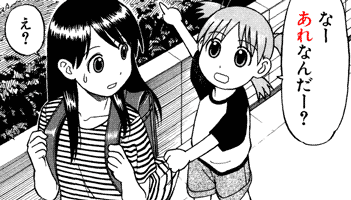
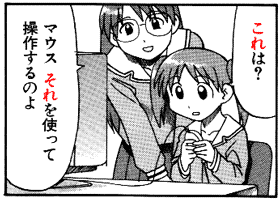
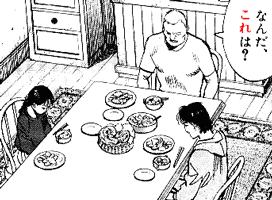
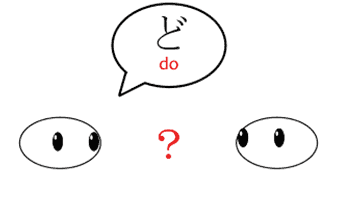
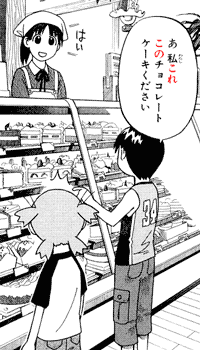
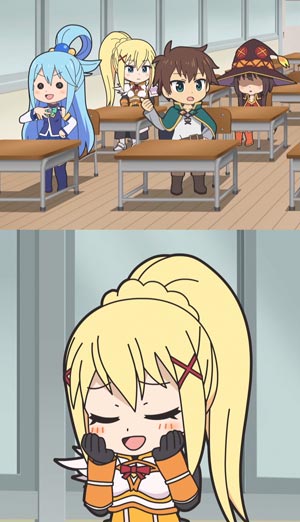
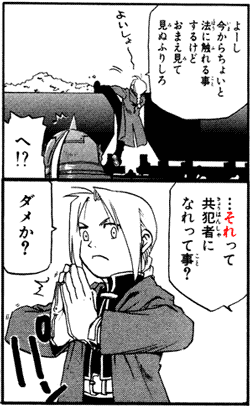
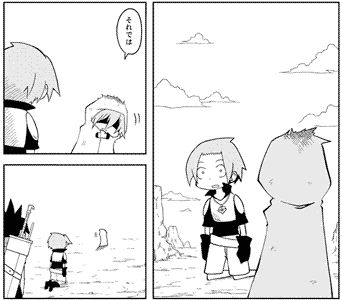
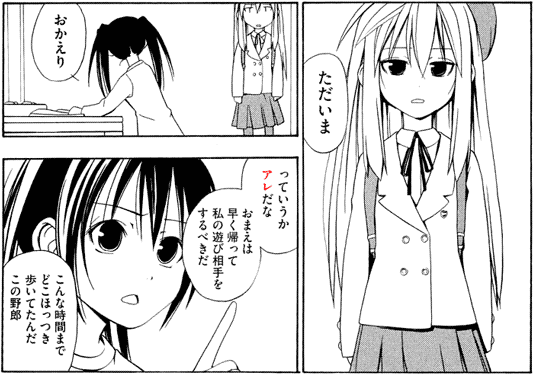
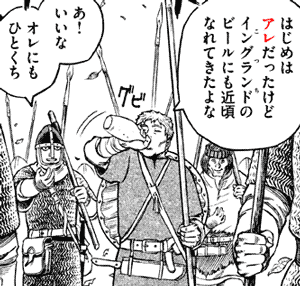
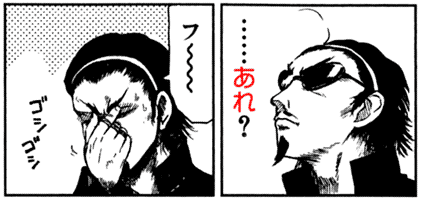
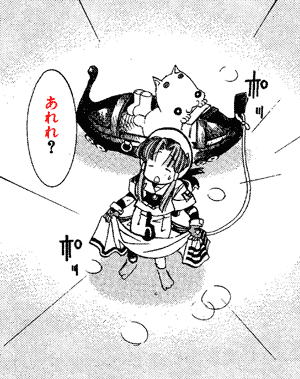
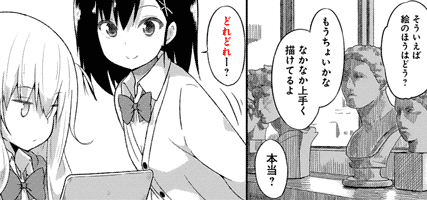
wow, so I've been trying to study japanese -self-taught- with some pdfs and such for a while. I'm kind of off and on...so I usually come across different material on the internet. Most of it pretty useful but hard to really assimilate in the end, perhaps because of how it is presented. I really loved the way the content is explained, so far this is the first series of pages I read, related to KOSOADO, but I'm already looking forward for the next useful couple of articles. Nothing to say that can express how surprised and amazed I am to have found this, except THANK YOU. Greetings from Honduras.
ReplyDeletePlease make an article on だけ because it would save my life. Just kidding, but it's one of the particles you have not covered in its own article at all, it seems. Your quality of writing would be very beneficial to a lot of learners .
ReplyDelete